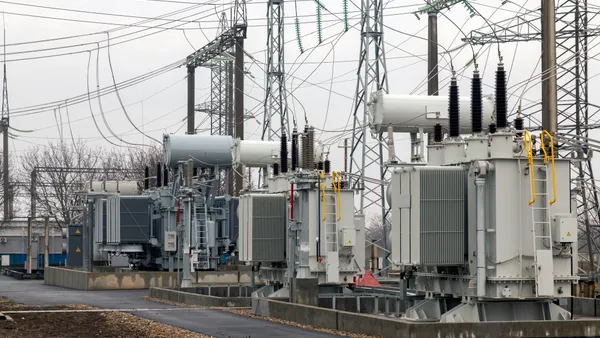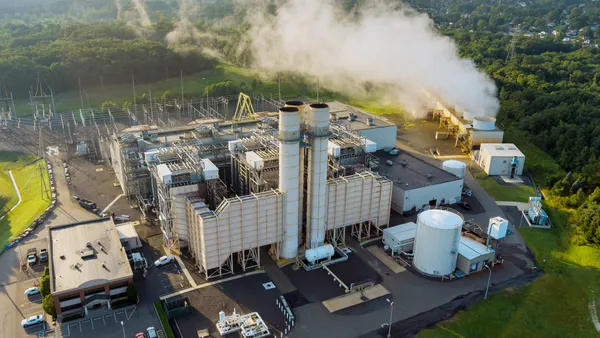UPDATE August 12, 2019: The brief has been updated to include a response from ISO-NE and written responses from FERC commissioners.
Dive Brief:
- Baseload generators in New England received assurance that they will be directly compensated for on-site fuel supplies by the region's grid operator in upcoming winters, as the Federal Energy Regulatory Commission allowed new short term reforms from ISO-New England (ISO-NE) to take effect on Tuesday.
- ISO-NE wants to reward baseload fuel generators for keeping an on-site fuel supply during winter months in an effort to boost resiliency during extreme cold weather events. The controversial short-term ISO-NE proposal was filed in March and took effect due to lack of FERC action, per the Federal Power Act. FERC could not act due to a lack of quorum, meaning at least two of the four current commissioners declined to vote.
- The Inventoried Energy Program will compensate resources for their on-site fuel supply during the winter months of 2023-2024 and 2024-2025, impacting the 14th and 15th ISO-NE Forward Capacity Auctions. While energy storage systems, hydropower and natural gas plants could participate in the new program, the plan will most benefit nuclear plants and fossil fuel plants with a large stock of fuel supply.
Dive Insight:
The short-term tariff could "potentially undermine" the ISO-NE's Competitive Auctions with Sponsored Policy Resources (CASPR) program, also intended to promote grid reliability, according to Avi Zevin, attorney at New York University's Institute for Policy Integrity.
The CASPR program aims to prevent state subsidized resources from depressing prices in the capacity market. The ISO is concerned those resources could push unsubsidized plants offline and prevent new entries, potentially threatening reliability.
FERC Commissioner Rich Glick has said that the "viability" of the CASPR program will depend on "whether it adequately facilitated the entry of state-sponsored resources."
Although the tariff is temporary, the Inventoried Energy Program specifically excludes certain resources that could provide reliability during winter.
"The Inventoried Energy Program will operate alongside the capacity market, including Pay-for-Performance and CASPR, through just two capacity commitment periods," and will be compatible with both, according to ISO-NE. The grid operator addressed this concern in a June 6 letter to FERC.
ISO-NE wrote to FERC in June to reiterate that the Inventoried Energy Program is intended to compensate resources for providing energy security during winters. However, the program "doesn't provide all the resources that would reduce the costs and risks" of extreme cold weather events, Zevin told Utility Dive, when fuel-security would be needed.
For instance, while offshore wind would not be compensated under this program, ISO-NE released a study in December crediting the resource for providing significant value during cold snaps.
The exclusion of offshore wind in this program is particularly important for developers as the short-term program will be in effect "when a lot of offshore wind is meant to come online" in the Northeast, Zevin said.
The Inventoried Energy Program was contested by renewable energy advocates and environmentalists who oppose subsidies for struggling fossil fuel and nuclear plants.
"FERC didn't specifically act on those protests because it wasn't able to reach a decision one way or the other," Zevin said.
Chairman Neil Chatterjee wrote that he would have accepted the tariff provisions, as the program "is aimed at broader concerns than the prior [ISO-NE] winter reliability programs."
The program would support address short-term winter energy security "in light of the misaligned incentives in the market, while the ISO completes development of a long-term market solution," he wrote in a statement on Thursday.
Glick called the new program "patently unjust and unreasonable."
The Inventoried Energy Program "goes so far as to hand out substantial payments to nuclear, coal, and hydropower generators with no indication that these payments will change their behavior in the slightest," he wrote in his statement issued on Thursday. "That is a windfall, not a just and reasonable rate."
FERC Commissioners Cheryl LaFleur and Bernard McNamee recused themselves from the docket.















